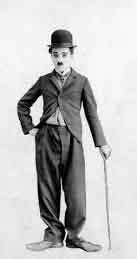Thinking About 1977
 1977 is the year when Charlie Chaplin dies. The death of that man, in my perception, represents the end of the possibility of a gentle modernity, the end of the perception of time as a contradictory, controversial place where different viewpoints can meet, conflict, and then find progressive agreement.
1977 is the year when Charlie Chaplin dies. The death of that man, in my perception, represents the end of the possibility of a gentle modernity, the end of the perception of time as a contradictory, controversial place where different viewpoints can meet, conflict, and then find progressive agreement.
Charlie Chaplin is the last man of modern times—the age of the machine, the horrible machine, coming into daily life and destroying daily life, but also the age of social conflict, of social consciousness, of solidarity. Charlie Chaplin is the man on the watch tower, looking at the city from a perilous vantage point, looking at the city of time, but also at the city where time can be negotiated and governed. In 1977, Charlie Chaplin died.
….but also 1977 is the year when Steve Jobs and Steve Wozniak, in their small garage in Silicon Valley, created the user-friendly interfaces for digital acceleration and mandatory unification of time. The Apple trademark was registered in 1977.
That same year a group of young British musicians for the first time cried no future. Don’t think about your future. You don’t have one. What Sid Vicious and the other Sex Pistols screamed and declared in 1977 was the final premonition of the end of modern times, the end of industrial capitalism, and the beginning of a new age, which is the age of total violence: financial globalization, deregulation, total competition, infinite war.
If capitalism wants to exist in the history of mankind, then the history of mankind has to become a site of total violence, because only violence is decisive.
Beginning in 1977, the word “competition” becomes the crucial term for economists. Now “competition” has become a natural word, a normal word. This is not right, because “competition” means violence, war.
….Competition is the concealment of a war machine in every niche of daily life: the kingdom of competition is fascism perfected.
—-Franco “Bifo” Berardi
excerpted from The Uprising, On Poetry and Finance